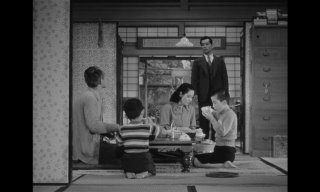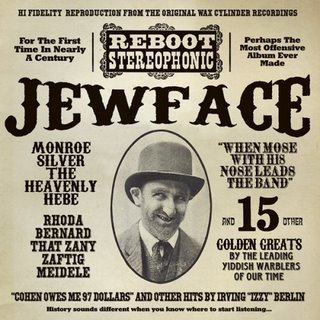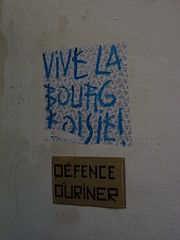Since I discovered Hou Hsiao-Hsien and Tsai Ming-Liang a few weeks ago, I've been on an Asian film bender. Latest was Café Lumière, which is an explicit homage to Yasujiro Ozu. There are a lot of superficial similarities between Ozu and Hou, and also a lot of people eager to
debunk them. Let's look at some shots side by side, shall we?
Here's the beginning of early summer. It shows most of the extended family, and even tells us what their roles are: father going off to work, sister watching the kids, grandfather and kids with few responsabilities. Low camera, as always in Ozu.

Here's the introduction of the family in
Café Lumière. Very similar shot, with the low camera and the use of the doors to frame the action and divide the space. Also shows the roles of the characters: mother in kitchen, father relaxing at the table, daughter somewhere in between. I'm sure the similarities are planned, but so are the differences: this is a more modern family, smaller and with more clutter.

Clearly both directors are concerned with social interactions within the family. Here is another pair of shots whose similarity is obvious. Both come at relatively dramatic moments of the film, and for both the face of the young woman is hidden. Here's Early Summer:

And here's
Café Lumière:
The point here is similar: the movie is less about the dramatic revelation itself and more about the way the family deals with it. Later scenes in both movies make it clear visually that these announcements cause some consternation. Noriko's parents turn their backs on her in frustration:

and Yoko's parents react strangely too. Her father says nothing, pushed to the corner of the frame. Her mother is more busy, running in and out of the frame (that's her on the right):

My point is not that Ozu and Hou are that similar. Like I said, this was planned as an homage to Ozu, so similarities in story and mise-en-
scène are greater here than in other Hou movies. Their concerns as filmmakers are different, too. Hou is a much more modern director than Ozu, and is more comfortable with movement. There are trains in both movies, lots of them, but they're used differently. Ozu uses his as a contrast with the satisfactions of a slower way of life:

That's the grandfather sitting behind the train, watching the clouds.
Hou's trains provide a more complex, even livable space. Here's Hajime on the train, seen from another moving train, in a shot that was understandably a bitch to get right. The speed is still there, but the movement of one train relative to the other is fairly slow. The speed of the modern city is something we've learned to deal with. In Hajime's case, something we can even find beauty in--here he's recording the sound of trains.

Oh, and one more thing. Usually when you subtitle a movie, you also translate the dialogue. But not always:




























